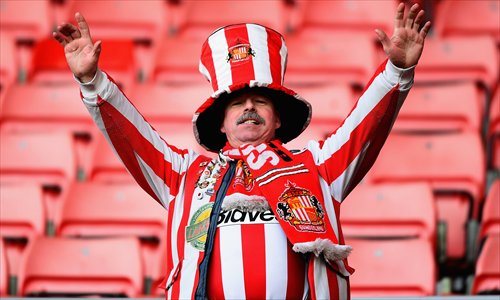HOME >> SPORTS
Premier League gravy train proving unstoppable
Source:Reuters Published: 2015-2-14 5:03:02
New TV deal for 2016-19 breaks bank again

A Sunderland fan poses at the Stadium of Light before the English Premier League match between Sunderland and Liverpool on January 10 in Sunderland, England. Photo: CFP
The soothsayers said it would not last, the bubble would burst and the English Premier League gravy train would run dry.How misguided they look after Tuesday's announcement by the world's richest soccer league that the new TV deal for 2016-19 is worth an eye-watering 5.2 billion pounds ($7.93 billion).
Sky Sports, the pay-TV channel that marketed the newly formed Premier League as "a whole new ball game" in 1992 and has been instrumental in its meteoric rise since, will pump in 4.2 billion pounds for 126 live games over the three years.
Bidding rivals BT Sport had to settle for the leftovers, but will still cough up 960 million pounds for two of the seven packages on offer - a total of 42 games a season.
The figures amount to a 70 percent jump on the 3.018 billion deal for the current contract, or put another way, 10 million pounds per game shown live from 2016-17 to 2018-19.
International broadcast rights are still to be factored in.
The new deal will make the Premier League, which is regularly watched by nearly 3 billion TV viewers in 170 countries and regions, comfortably the world's most valuable soccer league, and the second most profitable sports championship behind North America's National Football League.
No wonder Premier League Chief Executive Peter Scudamore was moved on Tuesday to describe humble Burnley as "economically" bigger than one of Europe's most-decorated clubs Ajax Amsterdam after disclosing the results of the latest bidding war.
But what does it mean for English game and the fans whose appetite for Premier League soccer, whether from inside the stadium or their living room, appears insatiable?
Rights bubble
For the owners and players of top-flight clubs and the TV executives, there is no bad news, according to Austin Houlihan, a senior manager at Sports Business Group Deloitte.
"With this latest round of Premier League deals we see no signs that the "media rights bubble" is going to burst any time soon, as some have predicted over the last 20 years," he said.
Premier League players already earn, on average, 40,000 pounds per week, more than any other soccer league, even if Spanish giants Barcelona and Real Madrid still pay king's ransoms for Lionel Messi and Cristiano Ronaldo.
The new deal could see even those two superstars enticed to further embellish the Premier League brand and boost the chances of England's top clubs in the Champions League.
Scudamore, who points out that the Premier League would plough money into grass-roots projects, said the quality of the product drove up the price.
"It is market forces," he told the BBC. "It is unscripted drama, the show the clubs put on.
"I am surprised by the size of it. Burnley are now, economically, bigger than Ajax. It is an endorsement of what the Barclays Premier League delivers that these broadcast partnerships have been extended and enhanced today."
Financial gap
There are losers though.
The financial gap between the haves and have nots is yawning and clubs such as Leeds United and Nottingham Forest, once big names in European soccer but now languishing in the second tier cut
off from the torrent of cash flooding into the Premier League, must wonder if they will ever return to the elite.
When Queen Park Rangers were promoted via the Championship playoffs in May it was worth at least 134 million pounds, even if they go straight back down, thanks to parachute payments.
Clubs that are relegated from the 2016-17 season will depart with an even bigger war chest, giving them a huge advantage over clubs aspiring to work their way up the pyramid.
The most contentious issue of all, though, is the fans who stump up for the most expensive tickets of any European league and create the sell-out atmospheres that make for such good TV.
Despite wallet-emptying ticket prices, last season's average attendance in the Premier League was 36,695, the highest in the top flight since 1949-50.
That loyalty needs to be rewarded, according to the likes of Gary Neville, one of Sky's most popular pundits.
"I want sensible ticket pricing and grass-roots football to benefit as much as possible from this deal. Who doesn't! This is a big issue!" the ex-Manchester United player said on Twitter.
Scudamore believes "the clubs will do the right thing" but fans will not be holding their breath.
Posted in: Feature